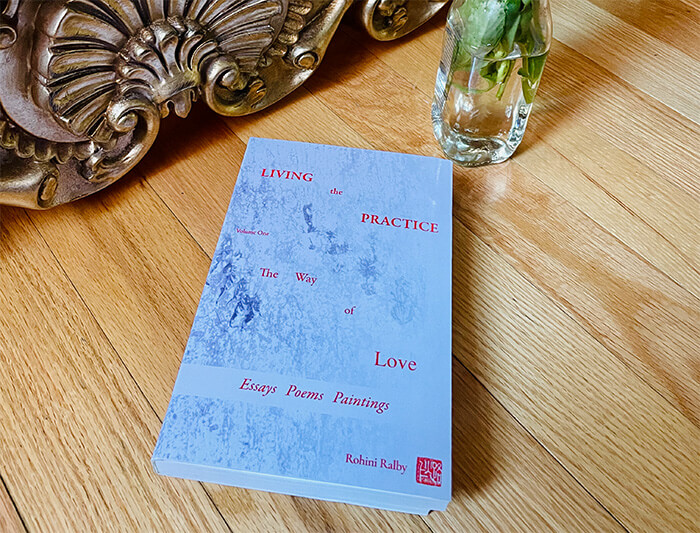There are books that we read and books that read us. The first volume of Rohini Ralby’s Living the Practice sits firmly in the second category. Whether digested in sequence or cracked open spontaneously, this collection of essays, poems and paintings is charged and alive. Ralby never trades in vague prescriptions to be mindful or present; rather, she speaks directly to the undercurrent of each moment and guides a practice that is both deeply personal and inherently universal – the contemplation and experience of God.
The Way of Love delivers a direct infusion of actionable instructions. You want God? Surrender. You want to heal? Detach. This no-frills guidance will have your ego turning with discomfort, hyperaware of its exposure under the lamp of Ralby’s fifty years of hard-won spiritual expertise. Her unflinching reflections on the human condition and uncompromising directives chip away at the false sense of self that keeps us from true and lasting happiness. From start to finish, her stance is straightforward and consistent: “We must break the cup and merge into the ocean.”
True to her early background as a trained dancer and Tai Chi Chuan teacher, each of Ralby’s essays feels like different choreography to the same music. Some are staccato, others more expansive and vulnerable. The context shifts effortlessly from the situational to the existential, the contemporary to the ancient, but all are underpinned by the wisdom of her Guru, Swami Muktananda Paramahamsa, to whom the book is dedicated. She describes the Guru not to be a person, body or personality but an unfaltering manifestation of the divine in one who is liberated from ignorance. Her deep love and devotion for her Baba saturate the pages – in poems, letters and stories drawn from her eight years as his close personal disciple, learning spiritual practice directly from him. These recollections clear away the nostalgic fog that so often obscures the golden age of globalised communal spiritual practice in the 1970s, when Westerners flocked to India and encountered Swamis like Muktananda and Maharishi Mahesh. Ralby has no interest in perpetuating such illusions. She delves into her experience of authentic discipleship and isolates the lessons of Love at its heart.
This book is practical to the core. It is to be felt on a deep level, not merely thought, contemplated and not intellectualized. The abstract paintings function as triggers for latent frequencies and unacknowledged emotions. The multi-directional poems use space to convey meanings that go beyond words. The Fourchotomy tool that Ralby devised two decades ago acts as a scalpel for cutting away attachments that keep us confined. Altogether, the volume serves as a roadmap for a journey that has bewildered philosophers and entranced sages since the beginning of time. Evelyn Underhill, in her classic text Mysticism – quoted by Ralby in the early pages of the book – critiques philosophical idealists as laying out a diagram of the heavens rather than a ladder to the stars. For the sincere seeker, or anyone who wants a clear understanding of what spiritual practice entails, Living the Practice is more than a book. It shares the map, but, more crucially, it places our feet firmly in the territory.
Yousra Elbagir is an award-winning journalist and writer. As a foreign news correspondent for Vice News on HBO and Channel 4 News, she propelled underreported stories to the forefront of international media – most notably, the 2019 youth-led Sudanese revolution. From radio to print journalism and documentaries, her work can be found on BBC Radio 4, Channel 4, VICE, the Financial Times, the Guardian and more. She is currently the Africa correspondent for Sky News.

